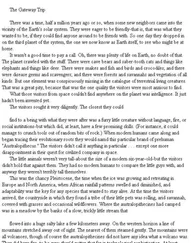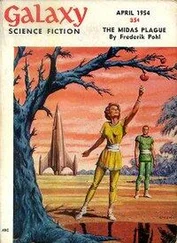Pohl, Frederik - The Age of the Pussyfoot
Здесь есть возможность читать онлайн «Pohl, Frederik - The Age of the Pussyfoot» весь текст электронной книги совершенно бесплатно (целиком полную версию без сокращений). В некоторых случаях можно слушать аудио, скачать через торрент в формате fb2 и присутствует краткое содержание. Жанр: Старинная литература, на английском языке. Описание произведения, (предисловие) а так же отзывы посетителей доступны на портале библиотеки ЛибКат.
- Название:The Age of the Pussyfoot
- Автор:
- Жанр:
- Год:неизвестен
- ISBN:нет данных
- Рейтинг книги:4 / 5. Голосов: 1
-
Избранное:Добавить в избранное
- Отзывы:
-
Ваша оценка:
- 80
- 1
- 2
- 3
- 4
- 5
The Age of the Pussyfoot: краткое содержание, описание и аннотация
Предлагаем к чтению аннотацию, описание, краткое содержание или предисловие (зависит от того, что написал сам автор книги «The Age of the Pussyfoot»). Если вы не нашли необходимую информацию о книге — напишите в комментариях, мы постараемся отыскать её.
The Age of the Pussyfoot — читать онлайн бесплатно полную книгу (весь текст) целиком
Ниже представлен текст книги, разбитый по страницам. Система сохранения места последней прочитанной страницы, позволяет с удобством читать онлайн бесплатно книгу «The Age of the Pussyfoot», без необходимости каждый раз заново искать на чём Вы остановились. Поставьте закладку, и сможете в любой момент перейти на страницу, на которой закончили чтение.
Интервал:
Закладка:
At the second, it was still startling.
She said, “Dear Charles. Don’t you ask your joymaker things?”
“I would, except I don’t know what to ask.”
“Oh, anything! What do you want? Have you filed an interests profile?”
“I don’t think so.”
“Oh, do! Then it will tell you what programs are on, what parties you will be welcomed at, who you would wish to know. It’s terrible to go on impulse, Charles,” she said earnestly. “Let the joymaker help you.’’
He discovered that his own teacup had been replenished and he took a sip. “I don’t understand,” he said. “You mean I should let the joymaker decide what I’m going to do for fun?”
“Of course. There’s so much. How could you know what you would like?”
He shook his head. . . .
But that was all of that conversation, all for then. His joymaker said suddenly, its voice curiously tinny, “Priority urgent! This is a drill! Take cover! Take cover! Take cover!”
“Oh, dear,” said Adne, pouting. “Well, let’s go.”
“Take cover!” blared the joymaker again, and Forrester discovered the reason for its metallic sound. Not only his but the girl’s, those of patrons at other tables, all the joymakers at once were repeating the same message. “Take cover! Countdown starts now! One hundred seconds. Ninety-nine. Ninety-eight.”
“Where are you going?” Forrester asked, rising with her.
“To the shelter, of course! Hurry it up, Charles, will you? I hate it when I’m out in a public place in one of these things.”
“. . . Ninety-one. Ninety. Eighty-nine. . . .”
He asked, swallowing hard. “Air raid? A war?”
She held his hand and was tugging him along toward an exit at the rear of the tea room, through which the other patrons were already beginning to stream out. “Not exactly, Charles dear. Don’t you know anything?”
“Then what?”
“Aliens. Monsters. That’s all. Now, hurry, or we’ll never get a seat.”
Five
A walk, an elevator ride, a short stretch through a light-walled corridor, and they came out into a great shadowy auditorium. There was just enough light to find their way to seats. It was filling rapidly, and behind them Forrester heard heavy doors slamming.
When about three quarters of the seats were filled, a man in black climbed onto the stage and said, “Thank you all for your cooperation. I’m pleased to be able to tell you that this building has achieved four-nines compliance in exactly one hundred and forty-one seconds.”
There was a stir of interest from the audience. Forrester craned his neck to find the source of the PA system—it seemed to murmur from all over the hall—and located it at last as the man spoke again. It was his joymaker, and all the joymakers, repeating what the man said.
“This is one of the best showings we’ve ever had,” he said warmly, “and I appreciate it. You may leave.”
“You mean that’s all there is to it?” Forrester asked the girl.
“That’s all. Are you coming up to my place?”
“But,” he went on, “if there’s going to be a raid, or any chance of one, shouldn’t we wait and see—”
“See what, Charles dear? There’s no need to grovel in the ground like moles. It’s just a test.”
“Yes, but—” He hesitated, and then followed her out of the auditorium thoughtfully.
It was confusing. No one had mentioned war to him.
But when he said as much to Adne, she laughed. “War? Oh, Charles! You’re so funny, you kamikazes! Now, we’ve wasted enough time—are you coming to my place for dinner or not?”
He sighed.
“Oh, sure,” he said. As brightly as he could.
In the life that had begun with his birth in 1932 and ended with the inhalation of a lungful of flame thirty-seven years later, Forrester had been a successful, self-sufficient, and substantial man.
He had had a wife—her name was Dorothy—small, blonde, a little younger than himself. He had had three sons, and a job as copy chief of a technical writing service, and a reputation among his friends as a fine poker player and useful companion.
Although he had missed combat participation in a war, he had been a Boy Scout during World War Two, participating in scrap-metal drives and Slap the Jap waste-fat collections. As a young adult he had lived through the H-bomb hysteria of the early fifties, when every city street blossomed out with signs directing the nearest way to a bomb shelter. He had seen enough movies and television shows to know what air raid drills meant.
He was not very satisfied with the one he had just seen. He tried to phrase his dissatisfaction to Adne as she changed clothes behind a screen, but she was not very interested. Drills were an annoyance to her, it was clear, but not a very serious one.
She came out from behind the screen, wearing something filmy and pale and not at all practical for cooking dinner. On the other hand, Forrester thought, who knew how these people cooked their dinners? She rustled over to him, lifted his hand, kissed his fingers, and sat down beside him, pulling her joymaker from the place by the arm of the chair where she had left it. “Excuse me, Charles dear,” she said; and, to the joymaker, “Receiving messages.”
Forrester could not hear what the joymaker said to her, because she was holding it close to her ear and had evidently somehow turned the volume down—which he resolved to learn how to do. But he heard what she said to it, although the words were mostly incomprehensible. “Cancel. Hold Three. Commissary four, two as programmed, two A-varied.” And, “That takes care of that,” she said to him. “Would you like a drink?”
“All right.” She lifted glasses out of the well of the— Forrester would have called it a cocktail table, and perhaps it was. He noticed her eyes were on a stack of parcels on a low table across the room. “Excuse me,” she said, pouring a glass of minty liquid for him and one for herself. “I just have to look at these things.” She took a small sip of her drink, rose, walked over to the table.
Forrester decided he liked his drink, which was not sweet and made his nose tingle. He stood up and crossed over to her. “Been shopping?” he asked. Adne was taking out clothes, small packets that might have been cosmetics, some things like appliances.
“Oh, no, Charles dear. It’s my job.” She was preoccupied with a soft, billowy green thing, stroking it against her cheek thoughtfully. With a twist of her arms she threw it around her shoulders and it became a sort of Elizabethan ruff. “Like it, dear?”
“Sure. I mean, I guess I do.”
“It’s soft. Feel.” She drew it over his face. It felt like fur, although its points thrust out again the moment they left his skin, looking starched and thorny. “Or this,” she said, taking it off and replacing it with something that had looked like oiled silk in the box it came in, but which, on her shoulders, disappeared entirely, except that it gave luster and color to her skin. “Or—”
“They’re all beautiful,” he said. “What do you mean, it’s your job?”
“I’m a reacter,” she said proudly. “Weighted at nearly fifty million, with two-nines reliability.”
“Which means?”
“Oh, you know. If I like a thing, chances are ninety-nine out of a hundred that the others will, too.”
“Fifty million others?”
She nodded, flushed and pleased.
“And this is how you make your living?”
“It’s how I get rich,” she corrected him. “Say!” She looked at him thoughtfully. “I wonder. Do you have any idea how many others like you have come out of the dormers? Maybe you could get a job doing the same thing. I could ask—”
He patted her hand indulgently, amused. “No, thanks,” he said, careful not to mention the fact that he was rich—although, he remembered dimly, he had been far less reticent about it at the party the night before. Well, he had made a lot of mistakes at that party—as witness his troubles with the Martian.
Читать дальшеИнтервал:
Закладка:
Похожие книги на «The Age of the Pussyfoot»
Представляем Вашему вниманию похожие книги на «The Age of the Pussyfoot» списком для выбора. Мы отобрали схожую по названию и смыслу литературу в надежде предоставить читателям больше вариантов отыскать новые, интересные, ещё непрочитанные произведения.
Обсуждение, отзывы о книге «The Age of the Pussyfoot» и просто собственные мнения читателей. Оставьте ваши комментарии, напишите, что Вы думаете о произведении, его смысле или главных героях. Укажите что конкретно понравилось, а что нет, и почему Вы так считаете.












